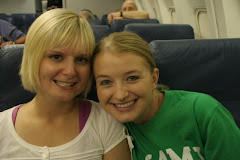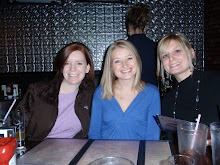 Rouge is a Cajun version of Little Red Riding Hood that I get out my best southern drawl with a few French phrases) or can be enhanced by reading it with a particular voice (I remember my grandma reading us The Gunniwolf when we were little in her best "guten sweeten song" voice). I have really enjoyed just listening to the people around me on this trip.
Rouge is a Cajun version of Little Red Riding Hood that I get out my best southern drawl with a few French phrases) or can be enhanced by reading it with a particular voice (I remember my grandma reading us The Gunniwolf when we were little in her best "guten sweeten song" voice). I have really enjoyed just listening to the people around me on this trip.I was riding the train back from London the other day when the man in front of me said something I could not understand. The English woman next to him asked him to repeat it because she didn't make it out either and then chided him for not using "Proper English" as he was clearly Irish, to which he responded, "well that's just how we speak." I find it very amusing how English is such an umb
 rella language that can sound so diverse depending on where you are, even within a country or region.
rella language that can sound so diverse depending on where you are, even within a country or region.I have noticed that Cheers is a universal catch-all word. It can mean 'enjoy this lovely frothy beverage I have just placed in front of you,' or 'hello, it is lovely to see you again,' or 'I am so glad we had this pleasant chat, I hope we do it again soon,' or 'Thank the Lord you are getting out of my check out line. Have a fabulous life.' It has also seemed common to call people 'love' when you are asking for something (like how much you owe in the check out line) or when you are saying goodbye, although I have had people say that to me in the States before. A lot of the common phrases popular in America are prominent here as well, if you swap "bin" for "throw away," "litter" or "rubbish" for "trash," "lollies" for
 "popsicles" and "kinder" for "everything that is delicious and amazing in life."
"popsicles" and "kinder" for "everything that is delicious and amazing in life."In an earlier blog, I addressed the volume issue I noticed between Americans and Brits... we are a much louder people, on the whole. This did not seem quite as true in Scotland or the more urban area of London; however, both places have a large influx of tourists which make it difficult to ascertain who really lives there. Of the people I have assumed to be native to England, I have noticed less public displays of affection (people that I have noticed holding hands do not appear to be English) with the exception of kissing hello or goodbye at the train stations. There are plenty of Americans who are firmly rooted in the 'no PDA' camp, as well as plenty who are not. I have not shaken anyone's hand since I have been here, but have not observed many formal instances in which (in America) it would be deemed appropriate.
The conclusions I can draw from these observations are to pay attention to those around me and try to fit in as much as I can with my volume level as to not be rude. On the accent front, I don't feel the need to injure the ears around me with my sad interpretation of a British accent and will save it for my kiddos who don't know any better. I will be keeping my hands to myself, both in terms of PDA and hand-shaking, and focus on having a good time.





Dear Christy,
ReplyDeleteI am enjoying your insights and truly wish I had fit into your suitcase. If and when I ever get to England you will have to go with your mom and I to be our tour guide.
Much love & prayers,
Momma Scholl
I like your translations of "cheers". It really is an all purpose phrase, and I love it. I enjoy using it at the end of emails because it can mean whatever positive insinuation the reader would like. However, not many Americans are familiar with it, so I only use it in certain emails. The sudden blunt American accent can also be a shock sometimes. I will admit to softening my "r" so as not to jolt my listener too much. At the hostel I stayed at in Derbyshire, everybody I talked to had a bit of start at what one man called "your American twang". Twang? It was after that sword thrust I began to round my "o" and ever so slightly broaden the "a" as I was so horrified by the concept of twanging in public. ;-)
ReplyDelete